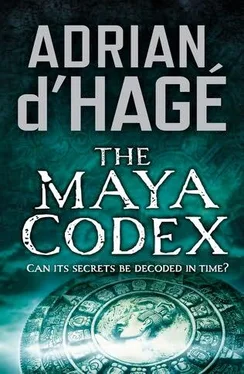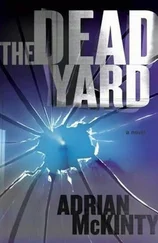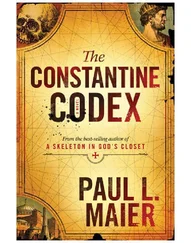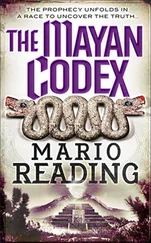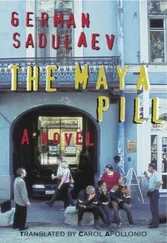Adrian D'Hage - The Maya codex
Здесь есть возможность читать онлайн «Adrian D'Hage - The Maya codex» весь текст электронной книги совершенно бесплатно (целиком полную версию без сокращений). В некоторых случаях можно слушать аудио, скачать через торрент в формате fb2 и присутствует краткое содержание. Жанр: Политический детектив, на английском языке. Описание произведения, (предисловие) а так же отзывы посетителей доступны на портале библиотеки ЛибКат.
- Название:The Maya codex
- Автор:
- Жанр:
- Год:неизвестен
- ISBN:нет данных
- Рейтинг книги:3 / 5. Голосов: 1
-
Избранное:Добавить в избранное
- Отзывы:
-
Ваша оценка:
- 60
- 1
- 2
- 3
- 4
- 5
The Maya codex: краткое содержание, описание и аннотация
Предлагаем к чтению аннотацию, описание, краткое содержание или предисловие (зависит от того, что написал сам автор книги «The Maya codex»). Если вы не нашли необходимую информацию о книге — напишите в комментариях, мы постараемся отыскать её.
The Maya codex — читать онлайн бесплатно полную книгу (весь текст) целиком
Ниже представлен текст книги, разбитый по страницам. Система сохранения места последней прочитанной страницы, позволяет с удобством читать онлайн бесплатно книгу «The Maya codex», без необходимости каждый раз заново искать на чём Вы остановились. Поставьте закладку, и сможете в любой момент перейти на страницу, на которой закончили чтение.
Интервал:
Закладка:
‘You married guys. One day you’ll wise up.’ Baecker swung into the nearby busy Industriestrasse and picked up speed. ‘Was in Gottes Namen!’ He slammed on the brakes and the deep klaxon of the truck’s powerful air horns rent the air. The Audi overtaking them had inexplicably moved into the inside lane, slowed and then stopped, in an attempt to box them in. Two men in balaclavas, brandishing machine pistols leapt from the car and raced towards them.
‘They’ve got guns, Bernhard!’ Dieter yelled. Baecker selected reverse and began to back up, the two balaclava-clad men in hot pursuit.
‘Halten Sie der Lastwagen!’
Baecker hit the brakes again, selected first gear and drove towards them. ‘Get down!’ he yelled at Dieter, but it was too late. One of the young thugs hired by the CIA to assassinate O’Connor and Aleta panicked. He unleashed a burst of fire which shattered the windscreen. Both men inside died instantly in a hail of bullets. Baecker slumped over the wheel and the twenty-tonne vehicle slewed off the road and mounted the footpath, ploughing into the front of a small cafe. The dozen or so patrons sitting at the outside tables, including two young mothers with their children in strollers, didn’t stand a chance.
The two gunmen raced back to their car. The team leader floored the Audi and took off, leaving a trail of smoking rubber behind the squealing tyres. A blue-and-silver police car passing in the opposite direction negotiated a savage U-turn and took off in pursuit, siren blaring and blue roof-lights flashing. A gas bottle in the back of the cafe exploded and the fire quickly took hold. Thick black smoke belched from the shattered ruins. Survivors screamed. Some ran, their clothes in flames, others crawled out in agony as more sirens sounded in the distance.
40
L ow cloud hugged the highland volcanic ranges, drifting down into the valleys, as the pilot lined up the aircraft for the final approach into Aeropuerto La Aurora, Guatemala’s international airport. Monsignor Jennings stared out the window from his business-class seat. Below, high-rise buildings competed for space with the slums of a teeming, vibrant city of over two million people, many of whom lived in abject poverty. Guatemala City was the country’s third capital. The first, Ciudad Vieja, located just to the east, had been destroyed by floods and volcanic eruptions in 1541. The second, Antigua, also close by, had been destroyed by a violent earthquake 200 years later.
Jennings had intended to catch a ‘chicken’ bus to Panajachel on the northern shore of Lake Atitlan, but through the low cloud he caught sight of the city’s Olympic stadium, with its distinctive blue seating that could hold 30 000 of the soccer-mad country’s fans. Just to the north of the stadium was the city’s Zone 1 and the red-light district. The old feeling stirred in his loins, and he resolved to spend the night in the city. The parish of San Pedro could wait another day. And in any case, it would give him a chance to talk to his contact at the Museo Nacional de Arqueologia y Etnologia. What had given cause for Weizman’s excitement?
Clear of customs, Jennings waddled out of Guatemala’s new terminal pulling his trolley bag behind him. He wore civilian clothes – jeans and a yellow sports shirt. The humidity and the heat were oppressive and already sweat was streaming down his florid face.
‘Zona Uno?cuanto?’ Jennings demanded of the driver of a battered yellow taxi outside the arrivals hall.
‘Cien quetzales,’ the dark, wizened Mayan driver replied.
‘A hundred quetzales! Daylight robbery! Setenta. Seventy,’ Jennings insisted, holding up seven fingers for emphasis. ‘ No mas! ’
The old taxi driver shrugged, and Jennings stepped inside. The city streets were choked with buses belching clouds of black diesel smoke, battered lorries with suspensions that had seen better days, brightly coloured chicken buses and the ubiquitous Toyota utes in various states of disrepair.
‘Hotel Rio, Avenida 6a,’ Jennings directed further.
Once they reached the hotel, Jennings paid the cab driver and hauled his luggage across the cracked tiles of the grimy reception foyer. The staff knew him well, and for a few quetzales would turn a blind eye to him bringing back a street boy or two.
‘ Quiere chica senor? Muy limpio. Muy buen polvo. You want girl, mister? Very clean. Very good fuck.’ Monsignor Jennings waved the young tout away with an irritable flick of his wrist.
‘Maricon! Vete a la mierda! Fuck off, you queer!’ the young tout shouted.
Jennings ignored him and turned into a dimly lit lane behind the bus station in one of the sleaziest parts of Zona 1, and headed for his favourite pick-up joint, el Senor Chico Club. The entrance was unmarked. Jennings paid the ten quetzales cover charge to the security guard, tipping him another twenty. The moustachioed thickset security guard, his stomach bulging behind a grimy dark-blue shirt, smiled slyly and pocketed the money.
‘Bienvenidos de nuevo, Senor Jennings. It’s good to see you again. Reynaldo is not in yet, but he’ll be here shortly.’
Reynaldo was only twelve, but he was like no other boy Jennings had ever known. A hot flush of anticipation flooded the dark depths of the monsignor’s soul. Reynaldo, like the other rent-boys in el Senor Chico, operated from small dingy rooms upstairs. They were paid the equivalent of US$10 for thirty minutes, half of which went to the establishment; but for regulars like Senor Jennings, and for a price, Reynaldo would be allowed off the premises. Jennings pushed through the dirty curtain that shielded the club from the street and worked his way through sweating, steaming patrons gyrating to the Weather Girls’ ‘It’s Raining Men’. The room reeked of the heavy, sweet, skunk-sage smell of pot, and strobe lights flickered through the smoke, momentarily illuminating the peeling blue paint on the flimsy walls. Young men danced with older men, mainly Europeans and Americans, their eyes glazed with a cocktail of ice, ecstasy and tequila. At the far side of the corrugated-iron bar, two young men were locked in a passionate embrace, each groping down the front of the other’s jeans.
‘Ron Zacapa por favor… con cubitos de hielo.’
‘Certainly, Senor Jennings. One Zacapa on the rocks coming up.’ The shirtless young barman flipped a heavy lowball tumbler into the air, caught it and scooped up some ice of questionable origin. He poured a shot of rum and slid the glass down the bar, his oiled torso gleaming in the reflected lights of the mirror ball.
‘On the tab, senor?’
Jennings nodded and threw back the rum, immediately ordering another. Unlike Bacardi or any of the other better known rums, Ron Zacapa Centenario did not come from the Caribbean or Jamaica, nor was it made from molasses. One of the world’s finest rums, it came from the first pressings of sugar-cane juice from Guatemalan farms. Distilled high in the mountains surrounding Quetzaltenango and aged in used American bourbon and whiskey barrels, the rich dark liqueur was made to be savoured, but Jennings needed a hit. He surveyed the room. At one end a worn wooden staircase led to the upstairs rooms that could be rented for 800 quetzales for four hours. The ‘take out’ price for Reynaldo would, he knew, be double that, but Jennings was prepared to pay. He felt a surge of anticipation as he spotted the young boy coming in through the back entrance.
‘Bienvenido a Ciudad de Guatemala, Senor Jennings.’
‘You’re free tonight, Reynaldo?’ Jennings’ voice was thick. His eyes roved lustfully over the boy’s slender form.
Reynaldo nodded, a glazed look on his handsome young face. It was a face devoid of humour; the joy of living once evident, extinguished. The authorities had tried hard to stamp out the child-sex trade, but as in any of the world’s large cities it still flourished, if you knew where to look.
Читать дальшеИнтервал:
Закладка:
Похожие книги на «The Maya codex»
Представляем Вашему вниманию похожие книги на «The Maya codex» списком для выбора. Мы отобрали схожую по названию и смыслу литературу в надежде предоставить читателям больше вариантов отыскать новые, интересные, ещё непрочитанные произведения.
Обсуждение, отзывы о книге «The Maya codex» и просто собственные мнения читателей. Оставьте ваши комментарии, напишите, что Вы думаете о произведении, его смысле или главных героях. Укажите что конкретно понравилось, а что нет, и почему Вы так считаете.
